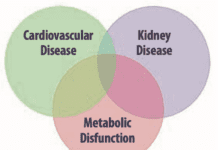Tilting the bodys balance between the omega-3 fatty acids found in fish and omega-6fats from other foods-in favor of more fish oil-may slow the aging of cells. A “provocative” new clinical trial reports that omega-3 supplementation helps improve the bodys ratio of fatty acids and slow a biological process related to aging-the shortening of DNA sequences called telomeres. The study supports a 2010 observational study similarly linking higher levels of omega-3s to slower cell aging in heart patients.


That doesnt mean fish oil is the fountain of youth, of course. Says Alice H. Lichtenstein, DSc, director of Tufts HNRCA Cardiovascular Nutrition Laboratory, “Currently, the best advice we can give is for people to consume at least two fish meals per week, preferably dark fleshed fish that is high in omega-3 fatty acids [see box], and to stay tuned for additional findings.”
So what might these results mean? One of the new studys co-authors, 2009 Nobel Prize winner Elizabeth Blackburn, PhD, of the University of California-San Francisco, likened telomeres to the ends of shoelaces, without which the lace would unravel. Similarly, telomeres at the end of chromosomesprotect cells during replication. With age, however, telomeres shorten; the length of telomeres is thought to be a marker of biological aging.
CHANGING YOUR RATIO. In the new study, published in Brain, Behavior and Immunity, researchers tested omega-3 supplements in 106 overweight and sedentary but otherwise healthy middle-aged and older adults. The randomized, double-blind trial assigned one group to 2.5 grams daily of omega-3s, another group to 1.25 grams daily and a third group to a placebo.
After four months, the omega-3 groups showed lower levels of inflammation and oxidative stress, both thought to affect cellular aging. Actual telomere differences between the groups didnt vary significantly, which scientists attributed to the short length of the trial. But a higher ratio of omega-3 to omega-6 fatty acids was associated with longer telomeres, a finding researchers said suggested improving this ratio “can impact cell aging.”
Lead author Janice K. Kiecolt-Glaser, PhD, of Ohio State University commented, “The telomere finding is provocative in that it suggests the possibility that a nutritional supplement might actually make a difference in aging.”
This four-month clinical trial echoes findings from a five-year observational published in JAMA in 2010. That study showed higher blood levels of omega-3s like those found in fish were associated with a slower rate of telomere shortening.
























